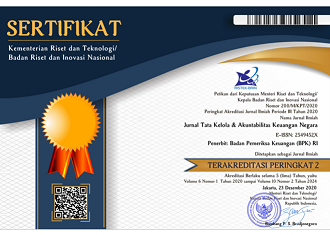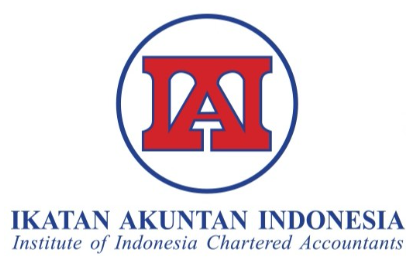DO THE GOVERNMENT EXPENDITURE AUDITS CORRELATES WITH CORRUPTION IN THE PUBLIC PROCUREMENT?
DOI:
https://doi.org/10.28986/jtaken.v6i1.378Keywords:
Audit, corruption, expenditure, local governmentAbstract
Public procurement is the main area of corruption in the government. This study aims to examine the correlation between government expenditure audit conducted by BPK and local government corruption behavior. This study uses a fixed effect panel regression approach and the dependent variable is the value of irregularities in the public procurement sector in all local governments in Indonesia. This study found that the government expenditure audit carried out in the previous period correlated with changes in local government corruption behavior. Local governments will reduce corruption behavior as an implication of changing views and calculating expected cost corruption based on their experience of being audited. Besides, local governments expect their probabilities to be re-audited. It is evident in the local government which has not been audited for three years that it will try to reduce its corrupt behavior because it is expected that this year will be audited again. This study suggests an increase in audit frequency that is expected to decrease the aggregate corruption level in public procurement in local government.
References
Becker, G. S. (1968). Crime and punishment: An economic approach. Journal of Political Economy, 76(2), 169–217. doi: 10.1086/259394
Becker, G. S., & Stigler, G. J. (1974). Law enforcement, malfeasance, and compensation of enforcers. The Journal of Legal Studies, 3(1), 1–18.
Bobonis, G. J., Fuertes, C. L. R., & Schwabe, R. (2016). Monitoring corruptible politicians. American Economic Review, 106(8), 2371–2405. doi: 10.1257/aer.20130874
BPK RI. (2014a). Ikhtisar Hasil Pemeriksaan Semester (IHPS) I Tahun 2014 (Summary of Semester Audit Results I Year 2014). Retrieved from https://www.bpk.go.id/ihps
BPK RI. (2014b). Ikhtisar Hasil Pemeriksaan Semester (IHPS) II Tahun 2014 (Summary of Semester Audit Results II Year 2014). Retrieved from https://www.bpk.go.id/ihps
BPK RI. (2015a). Ikhtisar Hasil Pemeriksaan Semester (IHPS) I Tahun 2015 (Summary of Semester Audit Results I Year 2015). Retrieved from https://www.bpk.go.id/ihps
BPK RI. (2015b). Ikhtisar Hasil Pemeriksaan Semester (IHPS) II Tahun 2015 (Summary of Semester Audit Results II Year 2015). Retrieved from https://www.bpk.go.id/ihps
BPK RI. (2015c). Keputusan Badan Pemeriksa Keuangan Nomor 7 Tahun 2015 tentang Rencana Strategis Badan Pemeriksa Keuangan Tahun Anggaran 2016-2020 (BPK’s Decree Number 7 Year 2015 concerning BPK’s Strategic Plan for Year 2016-2020). Retrieved from https://www.bpk.go.id/assets/files/attachments/attach_post_1457317017.pdf
BPK RI. (2016a). Ikhtisar Hasil Pemeriksaan Semester (IHPS) I Tahun 2016 (Summary of Semester Audit Results I Year 2016). Retrieved from https://www.bpk.go.id/ihps
BPK RI. (2016b). Ikhtisar Hasil Pemeriksaan Semester (IHPS) II Tahun 2016 (Summary of Semester Audit Results II Year 2016). Retrieved from https://www.bpk.go.id/ihps
BPK RI. (2017a). Ikhtisar Hasil Pemeriksaan Semester (IHPS) I Tahun 2017 (Summary of Semester Audit Results I Year 2017). Retrieved from https://www.bpk.go.id/ihps
BPK RI. (2017b). Ikhtisar Hasil Pemeriksaan Semester (IHPS) II Tahun 2017 (Summary of Semester Audit Results II Year 2017). Retrieved from https://www.bpk.go.id/ihps
BPK RI. (2018). Ikhtisar Hasil Pemeriksaan Semester (IHPS) I Tahun 2018 (Summary of Semester Audit Results I Year 2018). Retrieved from https://www.bpk.go.id/ihps
Brollo, F., Nannicini, T., Perotti, R., & Tabellini, G. (2013). The political resource curse. American Economic Review, 103(5), 1759–1796. doi: 10.1257/aer.103.5.1759
Citra, A. (2018). The effect e-procurement to corruption in the public procurement. (Unpublished master’s thesis).
Di Tella, R., & Schargrodsky, E. (2003). The role of wages and auditing during a crackdown on corruption in the city of Buenos Aires. The Journal of Law & Economics, 46(1), 269-292. doi: 10.1086/345578
Ferraz, C., & Finan, F. (2011). Electoral accountability and corruption: Evidence from the audits of local governments. American Economic Review, 101(4), 1274–1311. doi: 10.1257/aer.101.4.1274
Ferwerda, J., Deleanu, I., & Unger, B. (2016). Corruption in public procurement: Finding the right indicators. European Journal on Criminal Policy and Research, 23, 245–267. doi: 10.1007/s10610-016-9312-3
Goel, R. K., & Nelson, M. A. (1998). Corruption and government size: A disaggregated analysis. Public Choice, 97, 107-120. doi: 10.1023/A:1004900603583
Hopkin, J., & Pose, R. (2007). “Grabbing hand” or “helping hand”?: Corruption and the economic role of the state. Governance, 20(2). 187-208. doi: 10.1111/j.1468-0491.2007.00353.x
Khan, M. H. (2006a). Determinants of corruption in developing countries: the limits of conventional economic analysis. In S. Rose-Ackerman (Ed.), International Handbook on the Economics of Corruption (pp.216-245). doi: 10.4337/9781847203106.00015
Khan, M. H. (2006b). Governance and anti-corruption reforms in developing countries: policies, evidence, and ways forward (G-24 Discussion Paper Series). Retrieved from United Nations Conference On Trade and Development website: https://unctad.org/en/docs/gdsmdpbg2420064_en.pdf
Kleven, H. J., Knudsen, M. B., Kreiner, C. T., Pedersen, S., & Saez, E. (2011). Unwilling or unable to cheat? Evidence from a randomized tax audit experiment in Denmark. Econometrica Journal of Econometric Society, 79(3), 651-692. doi: 10.3982/ECTA9113
KPK. (2015). Laporan Hasil Kajian Pencegahan Korupsi Pada Pengadaan Barang dan Jasa Pemerintah. Retrieved from https://acch.kpk.go.id/id/berkas/litbang/kajian-pencegahan-korupsi-pada-pengadaan-barang-dan-jasa-pemerintah
Liu, J., & Lin, B. (2012). Government auditing and corruption control: Evidence from China’s provincial panel data. China Journal of Accounting Research, 5(2), 163–186. doi: 10.1016/j.cjar.2012.01.002
Masyitoh, R. D., Wardhani, R., & Setyaningrum, D. (2015, June). The influence of audit opinion, audit findings, and follow-up of audit results on corruption perception in second level local government. Paper presented at the 18th National Symposium on Accounting at North Sumatera University.
OECD. (2013). Preventing corruption in public procurement. Retrieved from http://www.oecd.org/gov/ethics/Corruption-Public-Procurement-Brochure.pdf
Olken, B. A. (2007). Monitoring corruption: Evidence from a field experiment in Indonesia. Journal of Political Economy, 115(2), 200–249. doi: 10.1086/517935
Porter, B. (1993). An empirical study of the audit expectation-performance gap. Accounting and Business Research, 24(93), 49–68. doi: 10.1080/00014788.1993.9729463
Rose-Ackerman, S. (1975). The economics of corruption. Journal of Public Economics, 4(2), 187–203. doi: 10.1016/0047-2727(75)90017-1
Rosyadi, C. F., & Budding, T. (2017). The effectiveness of BPKP fraud audit finding on determining the level of corruption in Indonesian provinces. Journal of Society and Governance, 1(2), 88–109.
Shleifer, A., & Vishny, R. W. (1993). Corruption. The Quarterly Journal of Economics, 108(3), 599–617.
Zamboni, Y., & Litschig, S. (2018). Audit risk and rent extraction: Evidence from a randomized evaluation in Brazil. Journal of Development Economics, 134, 133–149. doi: 10.1016/j.jdeveco.2018.03.008
Downloads
Submitted
Accepted
Published
How to Cite
Issue
Section
License

Jurnal Tata Kelola dan Akuntabilitas Keuangan Negara is licensed under
a Creative Commons Attribution-ShareAlike 4.0 International License




















